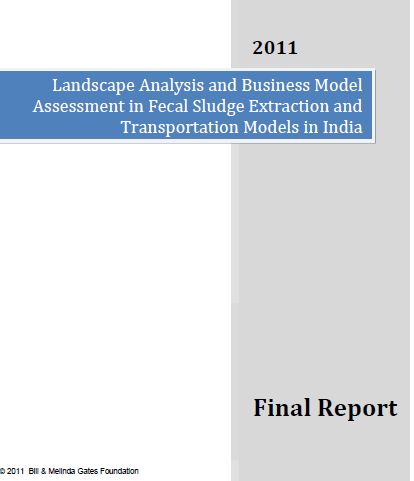Landscape Analysis and Business Model Assessment in Fecal Sludge Extraction and Transportation Models in India
Bhat, N. et al. (2011)

Published in: 2011
Publisher:
Consultancy report by The Right Angle commissioned by Bill & Melinda Gates Foundation, Seattle, USA
Author:
Bhat, N. et al.
Uploaded by:
SuSanA secretariat
Partner profile:
common upload
7082 Views
193 Downloads
Location of library entry
Content - Summary
This study on landscape analysis and business model assessment in fecal sludge extraction and transportation models in India covered a sample of 1200 households in three cities viz. Delhi, Jaipur and Madurai. These cities were selected based on an assessment of current household connectivity to sewerage systems at the state level. Discussions were held with officials vested with the responsibility of sanitation services and detailed business assessment of sampled emptying service providers were also carried out.
Key Recommendations:
Emptying service is pressed into service only when hydrological overloading takes place and tanks start overflowing. Waste water from these systems is drained out to the open drains daily. To make any noticeable improvement in sanitation, this needs to be improved before initiating any improvements in emptying services. Septic tank technology is outdated. Any fecal sludge emptying improvement, in the absence of investments in sanitation technology, including fecal sludge treatment will not result in significant improvement.
The number of septic tank owners in the core parts is shrinking but increasing in the peripheries and demand for emptying services in these areas has shown an increasing trend. These peripheral areas need immediate attention on fecal sludge management. Emptying business today stands on its own. Price is normally decided by the overall market phenomenon and negotiated between the service provider and the service receiver. Spatial spread of emptiers is almost even in the three cities.
Alternate financing models need to be promoted to support the business. Provisions made under the septage management sub-plan component of the National Urban Sanitation Policy can be leveraged for this purpose. Convergence of funds available under the National Safai Karmacharis Finance & Development Corporation can benefit a large number of emptying business owners.
In the absence of strong regulatory environment, it is not possible to separate septage from solid waste. The waste management services in all the three cities are dismal, despite the procedure for collection, transportation, treatment and disposal of solid waste being laid down well in the law. The key challenge is to achieve a balance between promoting emptying business and regulating the treatment and disposal of septage. Municipal corporations, therefore, need to provide designated places and facilities for septage dumping and promote fecal sludge treatment methods.
Awareness regarding scientific aspects of septic tank design and the need for regular emptying and upkeep of the tanks is poor across stakeholder categories. The national building codes are not entirely adhered to even by the public sector. Efforts are needed to update the codes to respond to the changing needs and educating all stakeholder groups. This will help in improving the quality of emptying business significantly.
Contact e-mail address: seektherightangle@gmail.com
Narayan Bhat
The Right Angle
Bibliographic information
Bhat, N. et al. (2011). Landscape Analysis and Business Model Assessment in Fecal Sludge Extraction and Transportation Models in India. Consultancy report by The Right Angle commissioned by Bill & Melinda Gates Foundation, Seattle, USA
Filter tags
East Asia & Pacific English Faecal sludge treatment processes Fundamental research and engineering Peri-urban















